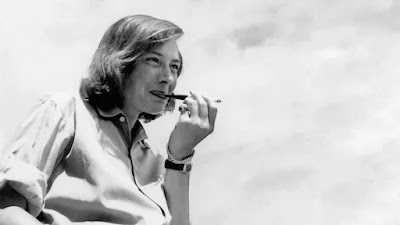LOVING HIGHSMITH is a fascinating but ultimately frustrating documentary about the enigmatic and spiky American author Patricia Highsmith. I have long loved Highsmith's books and the various film adaptations they have spawned. There's something curiously liberating and absurdly funny about her amoral criminal protagonists, not least the charismatic psychopath Tom Ripley. Set against these dark, disturbing crime novels, we then had the subversive romance of Carol, or The Price of Salt, in which a rich 1950s housewife finds a fulfilling happy ending with a young shopgirl. They don't suffer, they don't regret, they don't die. They live happily. One struggles to reconcile the two novelists and the many Patricia's. Is she a courageous and admirable figure - an undeniably important writer - the life of the party - fearless in her love life? Or is she a mean, alcoholic, anti-semitic misanthropist?
Vitija approaches Highsmith through her family and love life. We meet some of her family living in contemporary Texas, who speak of the buttoned up nature of life in the South of the 1950s. It seems incomprehensible that this literary woman grew up in the family of a rodeo-announcer! But what a fucked up childhood she had. Her mother divorced her father before she was born and apparently tried to abort her by drinking terps. Young Patricia was so aghast at being gay that she tried to sleep with men and conversion therapy. Per her lover and fellow author Marijane Meaker, everyone did, because of the endemic bigotry of the times.
Of all the interviews it is Meaker who is the most astute, and the most fascinating, depicting the lesbian underground scene in New York and the many reasons why Highsmith would've written The Price of Salt under a pseudonym. This is interspersed with archival footage of Patricia as well as Gwendolyn Christie reading excerpts from her diary, further explaining how career-ending writing a "gay book" might've been.
In addition to Meaker, we meet some of Patricia's lovers from her self-imposed European exile. Tabe Blumeschein and Monique Buffet are fascinating for the insight they show on life in 1970s and 1980s queer Europe, but I just didn't feel like I was getting at the core of who Patricia was. Maybe one cannot without really immersing oneself in her voluminous diaries. And maybe even then you would come against a kind of wall of subterfuge and unwillingness to allow emotion and vulnerability to penetrate. My abiding feeling finishing this documentary was one of a supreme artist but also of an emotionally thwarted life. They really do fuck you up, your mum and dad.
LOVING HIGHSMITH has a running time of 83 minutes. It was released in the USA last year and is playing BFI Flare 2023.



